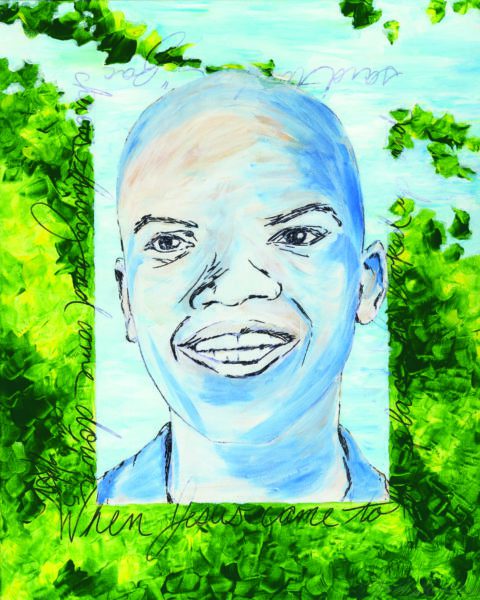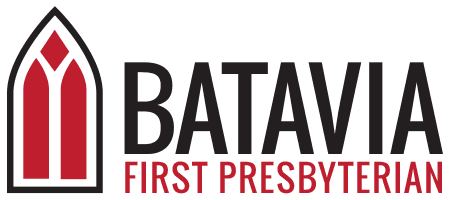
“Jesus Looked Up” by Hannah Garrity | A Sanctified Art LLC | sanctifiedart.org
“Unraveled: Unraveling of Dualistic Worldviews”
July 19, 2020
In the story for this week, Jesus gives us an example of reaching out in love and care to bring healing to the community from a worldview that separates people from each by using categories of good or evil/bad. In Luke 19, we hear about Jesus going to Jericho. There he notices a man that has been labeled by society as the bad guy. The story of Zacchaeus is only found in the Gospel of Luke. The story just before this one (chapter 18) is about the rich young ruler who has all the right theology and words about God, but has no ability to live his faith. Because of his wealth, he was unable to make the choice to follow the way of Jesus. But here in this story we are presented with another rich man who is generous and is able to reverse the oppressive trends of his profession and of his time. The story of Zacchaeus turns our expectations and prejudices upside down and it all hinges on Jesus’ example of seeing the beautiful humanity of Zacchaeus. I hope that the reflections below will connect with you on your journey of faith.
Scripture for Sunday: Luke 19:1-10
He entered Jericho and was passing through it. 2 A man was there named Zacchaeus; he was a chief tax collector and was rich. 3 He was trying to see who Jesus was, but on account of the crowd he could not, because he was short in stature. 4 So he ran ahead and climbed a sycamore tree to see him, because he was going to pass that way. 5 When Jesus came to the place, he looked up and said to him, “Zacchaeus, hurry and come down; for I must stay at your house today.” 6 So he hurried down and was happy to welcome him. 7 All who saw it began to grumble and said, “He has gone to be the guest of one who is a sinner.” 8 Zacchaeus stood there and said to the Lord, “Look, half of my possessions, Lord, I will give to the poor; and if I have defrauded anyone of anything, I will pay back four times as much.” 9 Then Jesus said to him, “Today salvation has come to this house, because he too is a son of Abraham. 10 For the Son of Man came to seek out and to save the lost.”
Theme Connections:
Zacchaeus perpetuates and profits from an economic system that robs and defrauds those on the bottom to benefit those on the top. He is a wealthy tax collector, which means he is not welcomed or wanted by most. Jesus flips the script by inviting Zacchaeus to offer him hospitality, which unravels the crowd’s expectations since they deem Zacchaeus a sinner and an unworthy host. Jesus invites Zacchaeus into community. Jesus invites Zacchaeus to belong. Zacchaeus responds with generosity, vowing to share his resources equitably. Zacchaeus shows us a holy and joyful unraveling.
What Has Unraveled and/or Is Unraveling?
• Zacchaeus’ vocation and identity.
• Zacchaeus’ complicity in an oppressive economic system.
• Zacchaeus’ greed unravels into radical generosity.
• The crowd’s expectations about who is and isn’t worthy.
Guiding Questions:
• Why does Zacchaeus anticipate Jesus’ arrival? What makes him believe Jesus might show mercy to a tax collector? (See Luke 5:27-32; 7:34; 18:9-14, 18-30).
• According to Jewish law, restitution required paying back original funds plus one-fifth more (Lev. 6:5; Num. 5:7). What does it mean that Zacchaeus offers to repay those whom he has defrauded four times more than what he took? What converts his greed into radical generosity?
• How might we, too, unravel our finances and spending practices from systems that oppress and defraud others? What does it look like to transform our own greed into generosity?
Quote for Inspiration:
“Here in the case of Zacchaeus, his ‘being saved’ refers to a conversion, to be sure, but not in any private sense. Not only is his household involved but also the poor who will be beneficiaries of his conversion as well as those people whom he may have defrauded. His salvation, therefore, has personal, domestic, social, and economic dimensions. In addition, we should not forget that in other stories ‘saved’ is translated ‘made well,’ ‘healed,’ and ‘made whole.’ Luke would object to confining the word to a condition of the soul. The whole of life is affected by Jesus’ ministry, a foretaste of the complete reign of God.”
—Fred B. Craddock. Luke: Interpretation, A Bible Commentary for Teaching and Preaching. Louisville, KY: John Knox Press, 1990. 220.
From the artist // Hannah Garrity:
Seeing, taking notice, acknowledging, lifting up—Jesus did all of these things as he looked up at Zacchaeus, calling him down, resting love and responsibility on his shoulders. I teach middle school art. I have spent this school year testing the waters. Each day I try a new collection of inputs for various situations. The most effective one is to stop in at every single student’s seat to have a personal conversation with them. In these conversations, I reiterate the assignment, glean information about what the student plans to do, and answer any questions. The byproduct is positive productivity. Is it because I’ve shown that I care? Is it because I’ve clarified the expectations? Is it because I simply acknowledged their existence in the room? Is it because I saw them? Middle schoolers don’t realize that you can hear and see them from across the room. Their maturity level is simply not there yet. In this image, Jesus looks up with grace. A shimmer of gold on his skin represents the presence of God in him. He takes notice of a selfish, greedy, and immature adult. Zacchaeus’ actions make me think he did not mature much after middle school. By the standards of society, exhibited by the comments of those around him, this man does not deserve to be acknowledged. When he is finally seen, all of his immaturity melts away. He immediately rises to the occasion. Take notice, acknowledge, lift up. See.
Look:
Take a few moments to gaze upon the artwork. Breathe deeply in quiet meditation as you observe the visual qualities of what you see: color, line, texture, movement, shape, form.
Now take a deeper look. What parts of the image are your eyes most drawn to? What parts of the image did you overlook?
Now engage your imagination. What story do you imagine for the figure?
Reflect:
-What has unraveled and/or is unraveling in this story?
– Why does Zacchaeus anticipate Jesus’ arrival?
-What converts his greed into radical generosity?
-Imagine Zacchaeus’ new vocation of generosity and compassion. What does he gain from this transformation? How are others impacted?
Write:
Are there ways that you, like Zacchaeus, participate in economic systems that oppress and defraud others? What spending practices may require your examination and consideration? In the space below, name small and practical ways you might practice financial generosity.
Pray:
Unravel me from the ways I am entangled with systems of oppression and harm. Amen.


